What career options exist for software engineers beyond coding?
Software engineers possess skills that extend far beyond programming — from communication and problem-solving to systems thinking and product insight. These strengths can open doors to roles like Developer Advocate, Sales Engineer, Product Manager, UX Designer, or Technical Writer. Each path lets you stay connected to technology while exploring new dimensions such as leadership, creativity, or strategy. The key is to leverage your technical expertise as a foundation, not a limitation.
Career changes are far more common than most people realize - the World Economic Forum reports that American adults hold an average of 12 different jobs by age 55, often reinventing themselves multiple times along the way.
So if you’re a software engineer daydreaming about a career beyond lines of code, you’re not alone.
While software engineering is rewarding, it’s not the only path for a tech-savvy professional. Your skills are more versatile than you might think.
Instead of a complete career overhaul, you can leverage your existing expertise in exciting new ways.
Here are 5 alternate career paths that let you use your software-engineering background to your advantage.
Do You Enjoy Coding & Connecting With People?
Consider becoming a Developer Advocate. This role is a perfect blend of coding, community management, and marketing.
Developer advocates are the voice of a company to the developer community and the voice of the developer community back to the company.
They create content like blog posts, tutorials, and videos, speak at conferences, and engage with developers on social media to help them use a company's products.
The average salary for a Developer Advocate in the United States is $86,320 a year, with top earners making $170,000 annually, according to ZipRecruiter.
It's a role where your technical and interpersonal skills can truly shine.
Can You Bridge the Gap Between Technical Products & Business Needs?
A career as a Sales Engineer might be for you. Sales engineers are the technical experts in a sales team.
They work with potential customers to understand their technical requirements and then explain how their company's product can meet those needs.
This role is ideal for engineers who enjoy problem-solving and have strong communication skills. You get to stay on the technical side of things while also being directly involved in the business side.
According to Springboard, sales engineering is a career with high earning potential, especially with commission.
Your technical background will give you a significant advantage in this field. If this sounds interesting, you might want to check out some sales resume examples to see how your experience can be framed for this role.

Are You Passionate About the 'Why' Behind the Product?
Transitioning into Product Management could be a fulfilling move. Product managers are responsible for a product's success from conception to launch.
They define the product vision, strategy, and roadmap. As a software engineer, you already have a deep understanding of the development process, which is a huge asset for a product manager.
Plus, according to ProductLeadership, product managers usually receive more pay compared to software engineers because of their broader set of responsibilities.
To succeed in this role, you'll need to develop your business acumen and customer empathy. Preparing for project management interview questions can be a good starting point for this transition.
Do You Want to Shape How Users Experience Technology?
A career in UX (User Experience) Design could be a great fit. UX designers focus on making technology user-friendly, accessible, and enjoyable.
Your software engineering background gives you a unique advantage because you understand the technical constraints and possibilities of what you're designing.
To make the switch, you can start by building a portfolio of design projects. Your experience with testing in software development is also highly transferable to UX design, where user testing is a crucial part of the process.
What if You Could Get Paid to Explain Complex Tech to Others?
Become a Technical Writer. Technical writers are the bridge between complex technical information and the end-user.
They create clear, concise, and easy-to-understand documentation, from user manuals to API guides.
As a software engineer, you already have the deep technical knowledge that companies are desperate for in their technical writers.
For instance, Google hires technical writers from a wide range of backgrounds, including software engineering, because they can quickly grasp complex technologies.
According to the U.S. Bureau of Labor Statistics (BLS), technical writers earn a median annual salary of $91,670, with about 4,500 job openings projected each year over the decade.

Wrapping Up
Feeling stuck in your software engineering career doesn't mean you have to start from scratch.
By exploring these alternative career paths, you can leverage your hard-earned technical skills in new and exciting ways.
And while you’re planning your next chapter, Hiration can help you craft a sharper resume, refine your interview strategy, and highlight your transferable strengths on LinkedIn with clarity and confidence.
Every great pivot starts with a single step - take yours today and see where your expertise can lead.
Alternative Careers for Software Engineers — FAQ
Can software engineers transition into non-coding roles?
Yes. Many engineers successfully pivot into roles such as Product Management, UX Design, Developer Relations, or Technical Writing — where their technical expertise remains highly valuable even without active coding.
What skills make software engineers great candidates for other careers?
Analytical thinking, problem-solving, technical communication, and cross-functional collaboration make engineers adaptable for roles in leadership, marketing, design, and customer-facing domains.
Is Product Management a good next step for engineers?
Yes. Engineers often excel as Product Managers because they understand how technology works and can communicate effectively between business and development teams while defining strategic product direction.
How can a software engineer move into Developer Advocacy?
Start by creating technical content — blogs, tutorials, or videos — and engaging with developer communities. Developer Advocates build bridges between companies and users through education, feedback, and outreach.
Are roles like UX Design or Technical Writing suitable for engineers?
Absolutely. Engineers already understand how systems work, which helps them design better user experiences or create precise documentation that simplifies complex concepts for broader audiences.
What if I still want to stay close to technology but not code daily?
Roles like Sales Engineer or Solutions Architect let you stay deeply technical while focusing on communication, strategy, and client needs — blending technical knowledge with business impact.
How can Hiration help with my career pivot?
Hiration’s AI-powered tools can help you rewrite your resume for non-coding roles, practice interviews for your target career, and tailor your LinkedIn profile to highlight transferable skills effectively.



